Training in 2024 is just as important as ever. How do you integrate training, education and continued learning with today’s busy contractor? Power Points, sales pitches and doughnuts. Tried and true methods of training gone by, that’s for sure. But what does today’s training look like, especially in the purview of the younger generation of Read more
Plumbing
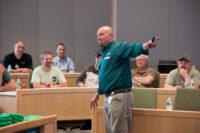
Training in 2024 is just as important as ever. How do you integrate training, education and continued learning with today’s busy contractor?
Power Points, sales pitches and doughnuts. Tried and true methods of training gone by, that’s for sure. But what does today’s training look like, especially in the purview of the younger generation of contractors that digests information in 90 seconds or less?
“What was that? Sorry, I was looking at my phone,” jokes Max Rohr, Director, Education and Technical Marketing, Caleffi. “Five years ago, a three-minute-long video was a good option, now it will seem long if it is over that 90-second threshold. Ideally, you get to the point in the first five seconds and work the explanation back from there. Like showing the cake and then going back to bowls of ingredients.”
According to, Dave Holdorf, Residential Trainer & Rep Training Manager—Eastern Region, Taco Comfort Solutions, it’s a challenge. “We’ve found that it helps to bring different instructors in for specific segments of the training. Each instructor brings their own perspective; even hearing a different voice in the room makes for a more compelling presentation. Every facet of our training is now geared to maintain the attention of participants. We also make sure to schedule breaks so that the attendees can attend to business, or need at home. By creating the curriculum with attendees in mind, their focus remains with the topic in front of them.”
Nevertheless, the training department at Taco has always looked at training not from a product view but from an application perspective, giving attendees the information they need to do their job better, and to give their customers the comfort they deserve. “We use real world experiences to solve real world problems with personal experiences and a bit of humor—as you know, John, it ain’t worth doing if you’re not having fun as well,” says Holdorf.
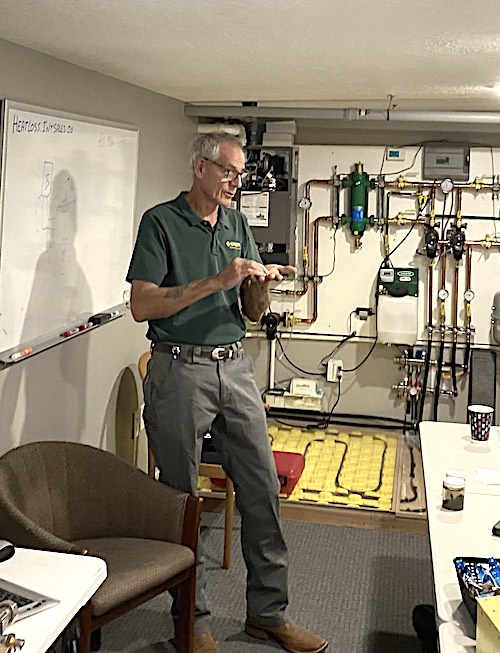
Caleffi’s Bob “Hot Rod” Rohr brings his props and his wealth of experience and knowledge to trainings.
But what about those PowerPoints and doughnuts? “Every learning style is different, so you have to be adaptable. If you see the audience tuning out a PowerPoint, stop and grab a product to bring to an attendee and talk about a case study that is related instead,” says Rohr.
In addition, everything falls apart for a trainer if the audience gets the impression they are overpromising, adds Rohr. For example, “Honesty is something Hot Rod is specifically good at in contractor training sessions. As a former installer, he always has tips for getting the job done and workarounds that are really tangible,” says Rohr.
The New Normal?
The Covid pandemic saw what we thought was going to be a new normal with virtual training, but what we are now seeing is the importance, and return, of in-person training.
This past year Taco saw a huge jump of in-person training, on the road as well as at Taco HQ in Rhode Island. So much so that the company had to dramatically increase the number of sessions back in Rhode Island to accommodate. “However, that does not mean to diminish the virtual training, Taco Tuesday and Taco After Dark webinars are still posting a large number of attendees that are hungry for information in bite size chunks, not as large as when we all locked down at home, but still popular,” says Holdorf.
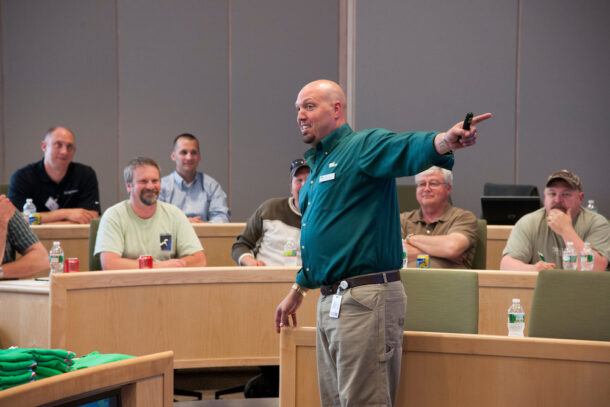
Taco’s Holdorf conducts a training at the Cranston, R.I. HQ.
Nonetheless, “when we’re online, we know it’s so easy to stray off to the next shiny thing online, so to keep attendees engaged, we encourage two-way communications. If participants have questions, we want them to ask immediately,” continues Holdorf.
In fact, Holdorf says that people who attend Taco’s webinars typically take it to the next level and seek live training. A combination of both virtual and live training can help attendees dial in on what they want to learn—or perhaps didn’t initially develop a full understanding of what it is they most needed to know. “These options allow them to fine-tune their training experience to make them as good as they want to be. And, ideally, we help them raise the bar. We routinely heard from trade pros who came to us for a better understanding of a single application or concept, and through that experience come away with an energized desire for much more,” says Holdorf.
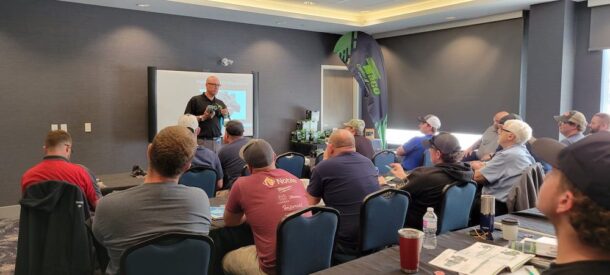
In 2023, Caleffi performed almost a 50/50 mix of in-person and virtual. Contractors like hands-on training, says Rohr, so it is good to be back on job sites for that type of interaction. And, engineers didn’t all go back to the office after COVID. “Many of the engineering sessions we do are virtual because that firm may be scattered all over the region. You might catch 20 people in a virtual training, where only 10 of them are in the office that day,” says Rohr.
Know-It-Alls
What about those who are stubborn enough to think that they don’t need further education and training? “I love this question and see and hear it often in the industry,” says Ken Midgett, L.M.P, Plumbing, Marketing Director, Interplay Learning, and former Teacher and Apprenticeship Instructor, Lehigh Career & Technical Institute.
Those in skilled trades should embrace the concept of being “lifelong learners,” consistently expanding their knowledge in their current specialty and exploring related disciplines. Whether licensed or not, individuals in skilled trades should assess their goals, career paths and professional growth within their field. It’s common for some to reach a point where they feel adequately skilled and think further education is unnecessary. According to Midgett, this assumption is misleading for several reasons:
• For example, a residential plumber could benefit from learning about commercial plumbing, Med Gas, Backflow, Water Well work, Water Conditioning, HVAC, Electrical, etc. Diversifying skills not only enhances one’s expertise but also increases their marketability across various skill sets, intern boosting income and long-term employability.
• Despite advancements in safety measures within the construction industry, the misconception that skilled trades workers are immune to injuries persists. While the overall safety landscape has improved, life-changing injuries can still occur. In such unfortunate instances, if an individual can only rely on skills specific to their trade and lacks versatility, their career may face irreparable damage. Therefore, investing in ongoing training, education, and professional development becomes crucial for ensuring resilience in the workforce and mitigating the impact of unforeseen challenges. Repurposing skillsets may be challenging when there has been no prior skill or professional development planning before the injury event.
• The industry, codes, tools, and methods to do a task are constantly changing. Skilled trades workers need to educate themselves and stay on top of new developments. This is critical to the success of a technician and company.
In the end, it’s what ends up in the ol’ noggin as useful information that translates to the jobsite. “Students only retain a tiny amount of the information that you present to them, but they will remember their feelings about the trainer for a very long time,” says Rohr. “It is hard to know if a bigger win is when customers retain a piece of information you presented or if they remember that you seem like you know what you are talking about. “If they trust that you did a good job, that memory will stay with them for a career, potentially.”
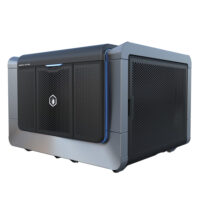
A new smart home appliance creates water from the moisture in the air at scale. The WaterCube 100 (WC-100) is an IoT-enabled home and office appliance that is the size of an HVAC unit and sustainably generates more than 100 gallons of fresh water daily from the air around it — enough for a household Read more
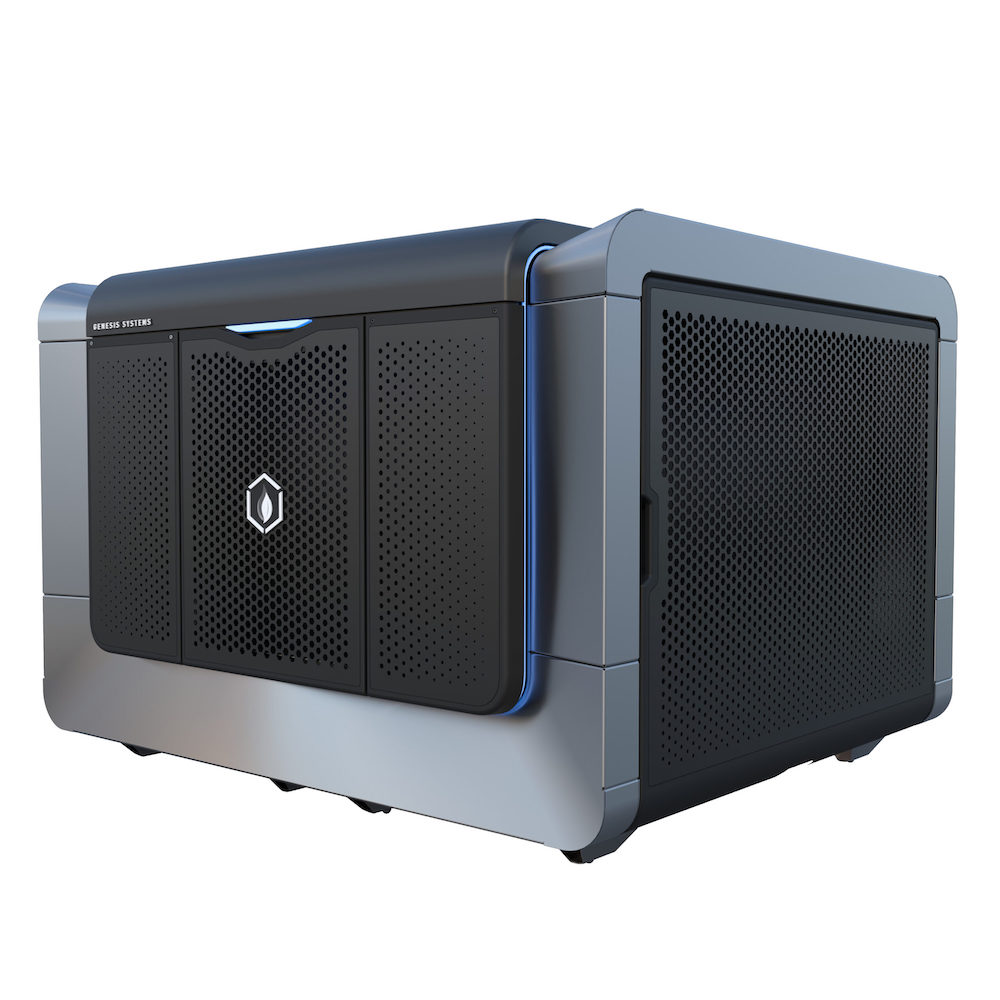 A new smart home appliance creates water from the moisture in the air at scale. The WaterCube 100 (WC-100) is an IoT-enabled home and office appliance that is the size of an HVAC unit and sustainably generates more than 100 gallons of fresh water daily from the air around it — enough for a household of four. The WaterCube 100 uses Renewable Water from Air (RWA) technology that mimics nature’s process of extracting water from the air.
A new smart home appliance creates water from the moisture in the air at scale. The WaterCube 100 (WC-100) is an IoT-enabled home and office appliance that is the size of an HVAC unit and sustainably generates more than 100 gallons of fresh water daily from the air around it — enough for a household of four. The WaterCube 100 uses Renewable Water from Air (RWA) technology that mimics nature’s process of extracting water from the air.In partnership with Pennsylvania’s Energy Coordinating Agency, company donates eight water heaters to families in need during Random Acts of Kindness Week. Ambler, Pa. — Eight low-income Philadelphia families are receiving new energy efficient water heaters, thanks to a generous donation from Bradford White Corporation, an industry-leading American manufacturer of water heaters, boilers and storage tanks Read more
In partnership with Pennsylvania’s Energy Coordinating Agency, company donates eight water heaters to families in need during Random Acts of Kindness Week.
Ambler, Pa. — Eight low-income Philadelphia families are receiving new energy efficient water heaters, thanks to a generous donation from Bradford White Corporation, an industry-leading American manufacturer of water heaters, boilers and storage tanks.
The donation, which comes during Random Acts of Kindness Week, stems from Bradford White’s signature charitable giving initiative, Industry Forward®. Eight 40-gallon water heaters are being provided to very deserving families who have contacted Philadelphia’s Energy Coordinating Agency (ECA) Heater Hotline. ECA is an Industry Forward® partner that has a strong history with Bradford White.
Rich-Tomkins, a manufacturer’s representative for the company, helped coordinate the product delivery and ECA’s trained staff, which helped identify families most in need, will be installing the water heaters.
“At Bradford White, giving back to our communities and providing help to those in need, is part of our mission and core values as a company,” said Rebecca Owens, senior manager of communications for Bradford White. “By providing water heaters to several families in need during Random Acts of Kindness Week we hope to inspire others to show kindness and give back as well so we work together to make a positive impact on people’s lives. We are truly grateful to partner with ECA and provide essential hot water to families who have been without for far too long.”
ECA’s Heater Hotline team receives numerous calls each week from low-income families who have no hot water because water heater replacement is not covered under other low-income programs. Such calls often come from senior citizen homeowners or families who resort to the dangerous practice of heating water on a range for bathing and household cleaning.
The Philadelphia Emergency Water Heater Fund, created by ECA in 2022, has already used its allotted funding for the year and Bradford White stepped up to assist when it heard of the need.
“We are deeply appreciative of the continued partnership with Bradford White and their generosity through their innovative Industry Forward® program,” said Steve Luxton, ECA chief executive officer. “There are so many families in need of hot water and Bradford White’s continued support to lend a hand and give back to families in need is so important. They are a true partner to Philadelphia families, many of whom are struggling to make ends meet.”
Bradford White has partnered with ECA on several recent projects, including a $50,000 Industry Forward® grant to help ECA launch a pilot internship program for young people and emerging workers from Philadelphia’s disadvantaged communities to receive training on heat pump water heater installation and maintenance.
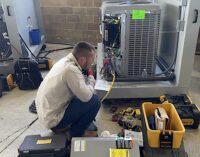
Mechanical Hub recently talked with Rich Camacho, CEO, Blue Recruit, about the hiring of qualified candidates to potential trade jobs. Blue Recruit is a company that provides skilled workers with a revolutionary path to success. While that mission is straightforward, reaching that goal requires tremendous collaboration between industry, educational systems and supporting organizations. Here is Read more
Mechanical Hub recently talked with Rich Camacho, CEO, Blue Recruit, about the hiring of qualified candidates to potential trade jobs. Blue Recruit is a company that provides skilled workers with a revolutionary path to success. While that mission is straightforward, reaching that goal requires tremendous collaboration between industry, educational systems and supporting organizations. Here is our discussion with Rich:
MH: What do you think the industry (PHVAC) can be doing better to recruit more to the trades?
CAMACHO: An issue we hear constantly amongst PHVAC companies, to a far greater extent than any other trade, is the idea that their company is “different.” I don’t know if it is a culture issue within PHVAC or a lack of competitor awareness, but many PHVAC owners have this misguided belief that the services they provide are more complicated than their competitors and thus must only hire highly experienced technicians and installers. Guess what, 95% of y’all provide the exact same services as the other five shops in your town and you are all fighting over the same technician or plumber that has seven years under their belt.
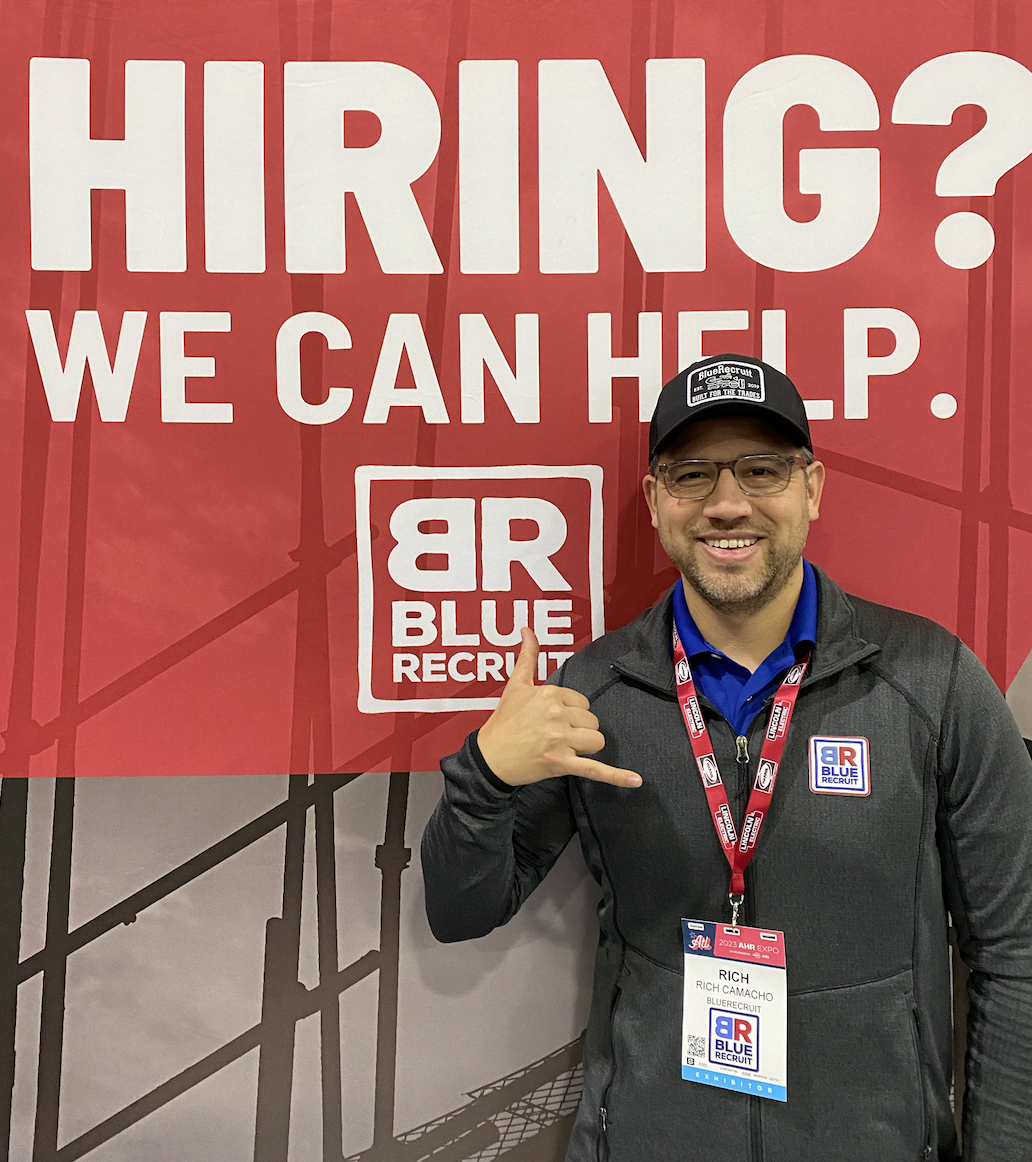 The insistence that you can only hire extremely experienced workers is a major hurdle to growth. Too often people complain “young people don’t want to work,” “they’re lazy,” “they are avoiding the trades to be social media influencers,” etc. Well, guess what? When you refuse to even interview someone trying to launch their skilled trades career, you become a major part of the problem. That business owner needs to remember that they were once a brand-new Apprentice, and someone took the time to train them. We will never train the trades’ next generation if we do not give them the opportunity to get started.
The insistence that you can only hire extremely experienced workers is a major hurdle to growth. Too often people complain “young people don’t want to work,” “they’re lazy,” “they are avoiding the trades to be social media influencers,” etc. Well, guess what? When you refuse to even interview someone trying to launch their skilled trades career, you become a major part of the problem. That business owner needs to remember that they were once a brand-new Apprentice, and someone took the time to train them. We will never train the trades’ next generation if we do not give them the opportunity to get started.
MH: Piggybacking off of this, how do we do a better job highlighting pay, lifestyle, for example, as huge positives while reducing the negative stereotypes with the trades?
CAMACHO: A major trend we have seen in recent years is that the average person is now well aware of the compensation potential in the trades. Trade and vocational schools are seeing higher enrollment than ever before. After all, if you’ve had your AC replaced or made an emergency plumbing call in the last three years you can vividly recall how many zeros where in that invoice.
However, what we as an industry are failing to promote is the flexibility the trades provides and the intrinsic benefit of the work itself. Compensation is actually the third most important factor for Job Seekers in deciding between job offers. A lasting impact of COVID is the desire for flexible schedules, and the trades often provide this freedom. Second, an astounding 87% of trades workers report being either satisfied or very satisfied in their work, while 62% of white-collar workers describe their work as “drudgery.” Remember those data points next time you hear a parent tell their child that the only way to succeed in life is by going to traditional 4-year college.
MH: During Covid, contractors were deemed essential workers. Do you think this heightened awareness to the trades as pandemic-proof and recession-proof to a certain extent?
CAMACHO: There is ZERO doubt that the trades are and will forever be the most recession-proof career track. After all, in a downturn economy, a family may decide not to take a planned vacation, might delay that planned home renovation, but they will still make the service call when their air goes out or the sink is overflowing.
With all the terrible that COVID brought us, a lasting positive legacy it left is the light it shined on what I’ll be bold enough to call the “Higher Education Cartel.” Insane student debt levels, often meaningless degrees, and social issues has shown many young people—just as importantly their adult influencers—that the trades are not a secondary option but a true avenue to success. Afterall, graduate enrollment rates are down about 15% from their 2010 highs, but construction focused trade school enrollment is up over 19% in that same period!
MH: We’ve been hearing a lot lately regarding hiring based on work ethic, abilities, desire, etc., and companies can the train the “skill.” Are you in agreement with this? Explain.
CAMACHO: Socrates once said the following, “The children now love luxury; they have bad manners, contempt for authority; they show disrespect for elders and love chatter in place of exercise. Children are now tyrants, not the servants of their households.”
In other words, the older generation has ALWAYS thought that the younger generation is lazy, lacks discipline, etc. I’ll be the first to say that categorizing all young people in this way is simply incorrect. Every single day, whether it be in the interactions we have with students at one of our partnered trade schools, a SkillsUSA classroom, or feedback from a customer, we’re exposed to motivated young people working hard to grow their skills and build a lasting career.
I believe that such character traits are mostly built at a very young age in the home, and unless your company is operating a three-month bootcamp and shaving heads, it is unlikely you can truly develop such soft skills. The best way to see a person’s values and ethics before hiring, is to include personality assessments within your interview process which will identify strengths and weaknesses.
We also recommend having that potential candidate spend a half day onsite, shadowing your team, touring your facility, and ending the interview with a group lunch. This allows your employees to play a part in the hiring process and allows you to see how they will interact with others (including restaurant staff) on a social or personal level.
MH: How does someone get involved with Blue Recruit?
CAMACHO: Couldn’t be easier, go to www.BlueRecruit.com and create your free account in about 5 minutes. You can view live available talent in your area, hire when you’re ready, and if you have any questions, we host live training demos every workday at 10, 12, and 2 pm EST.
Finally, we love working with partners like Mechanical Hub, and we continue to do our part in connecting the workers that keep our country moving forward with tremendous employers.

Mechanical Hub is kicking off a series of posts of what we see as trending topics for 2024. The first in the series is Artificial Intelligence. As an editor covering the PHVAC industry for more than 20 years, not too much has been as polarizing as the topic of Artificial Intelligence (AI). Okay, maybe press Read more
Mechanical Hub is kicking off a series of posts of what we see as trending topics for 2024. The first in the series is Artificial Intelligence.
As an editor covering the PHVAC industry for more than 20 years, not too much has been as polarizing as the topic of Artificial Intelligence (AI). Okay, maybe press technology, tape vs. dope or drain cleaning is plumbing. But I digress.
What’s interesting to me is that AI is all around us, and whether we know if it “shits in the woods,” does that make it okay? Listen, we’ve all had conversations around a certain topic only to find out later that said topic has now filled your social media feed. But we’ve become to desensitized to that by now, haven’t we?
Recently, the once revered Sports Illustrated magazine employed a product review columnist, that wasn’t. I mean he didn’t exist. It was revealed the columnist was AI generated, picture and all, and so was the creation of content. So what information is real or believable?
Coming full circle, I was working recently on a case study regarding a pretty sizable mechanical contractor and a boiler retrofit. I was told to reach out to the marketing department for some background info and some initial quotes on the project. When I submitted the story to the contractor for review and approval, I was asked if I had used ChatGPT for the article. Say what?! As it turns out, I had been working— via email—with a PR intern and he used ChatGPT pretty extensively. Turns out, the two sentences I included in the text to describe their own company were, in fact, auto generated. But why? Easy and efficient means of collecting information, I guess.
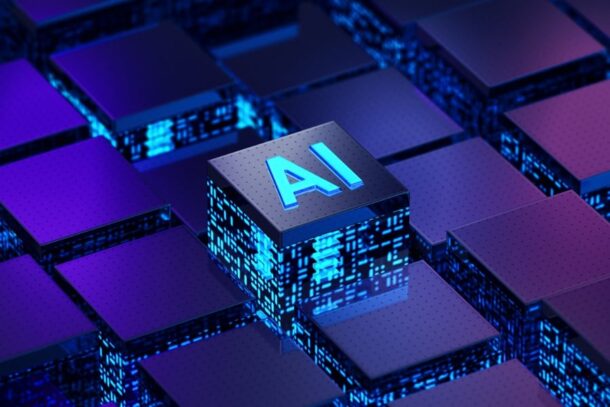
But there is much more to AI than just chat bots—such as data collection and machine learning, for example. There are some in the industry that follow AI much more closely than me, and there is a growing consensus is that we need to embrace AI. “The crux of Artificial Intelligence is that it is already here, so we have two choices: either get shaped by it or we shape it,” says Anmol Bhasin, Chief Technical Officer, ServiceTitan.
John Mullen, industry subject matter expert, has an optimistic take on AI and how it will shape our industry over the next decade or two. “My philosophy on AI remains malleable on a personal front always, as we continue into this new era of AI being everywhere. With that said, it’s clear that plumbing and mechanical work has been having a revolutionary moment with the advancement of technology in construction materials and tools. These next few years will undoubtably keep the skilled trades trending in the right direction as an opportunity to work, learn and live well,” says Mullen.
There are so many opportunities in our industry for advancement with artificial general intelligence (AGI) and GPT chat bots that assist with dataset specific outputs, continues Mullen. “I’m excited for the organization of efforts, focused on the sustainability of our planet and how it can help us build resilience. Quality data is what makes artificial intelligence impactful, and if harnessed correctly, we could make transformative changes and provide an undeniable increase to the quality of our daily lives.”
Yet, is there any oversight on AI? Last October, the White House released a statement on AI which reads, “Artificial intelligence (AI) holds extraordinary potential for both promise and peril. Responsible AI use has the potential to help solve urgent challenges while making our world more prosperous, productive, innovative, and secure. At the same time, irresponsible use could exacerbate societal harms such as fraud, discrimination, bias, and disinformation; displace and disempower workers; stifle competition; and pose risks to national security. Harnessing AI for good and realizing its myriad benefits requires mitigating its substantial risks.
“The Federal Government will enforce existing consumer protection laws and principles and enact appropriate safeguards against fraud, unintended bias, discrimination, infringements on privacy, and other harms from AI. Such protections are especially important in critical fields like healthcare, financial services, education, housing, law, and transportation, where mistakes by or misuse of AI could harm patients, cost consumers or small businesses, or jeopardize safety or rights. At the same time, the Administration will promote responsible uses of AI that protect consumers, raise the quality of goods and services, lower their prices, or expand selection and availability.”
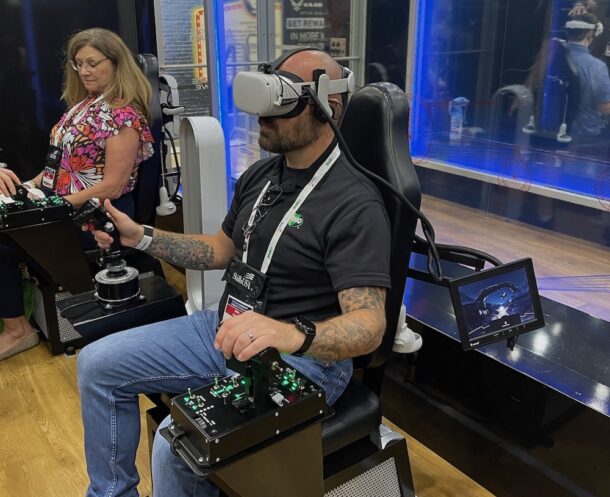
John Mullen is continuously seeking out the new trends and technology. Here, John is checking out the latest in VR tech.
However, as of right now, says Mullen, we are in the organize phase, where data is being collected and integrated without a real unbiased vetting of knowledge. This is an era that will be ripe with scams and schemes but before long, we will be in the most optimized and transparent version. Most will utilize artificial intelligence and scale their needs to help assist with the things we no longer have the passions to pursue. “It looks to me like skilled trade work is going to get very technical over the next few years and that is super exciting. Having a general understanding of how to use and prompt AI models as a service provider will become a standard skillset for the workforce. This becomes truer each day, as contractors build buildings for the most technical end users the world has ever seen,” says Mullen.
According to Bhasin, data is an industrial revolution in and of itself, and AI is taking it one more level forward. “Over the last year, year and a half AI has leveled the playing field because the barrier to entry has suddenly and dramatically dropped.
For example, “For Service Titan’s Titan Intelligence, there were peculiar scenarios where we saw opportunities for optimization and started putting algorithms there to facilitate outcomes for our customers. If you bridge that and collect all of these features together, the results are best practices for the contractors using AI algorithmically to facilitate those specific outcomes of top line revenue efficiency and effectiveness,” says Bhasin.
Mullen says that we must stay vigilant about AI during the initial programming. “This technology was developed to outpace humans in all the tasks and protocols we, the collective society, have established. This will undoubtably lead to the emergence of information about how and why we do the things we do, leading to gained efficiencies and greater understanding of general principles,” says Mullen.
But what about those legitimate concerns with AI such as data breaches, social manipulation, fake news, etc.? “Much of this will be resolved through exposure and transparency,” says Mullen. “I think we are going to learn a lot about ourselves over the next few decades and with the help of AI, we’ll have an easier time determining good from bad with analysis and visualizations of data.”
Bhasin says that world of hackers is an enemy that is never going away so you have to keep up on your game. An ironic twist, “All of this AI stuff we’re talking about; it is the similar set of technologies we are placing against for safeguarding from nefarious actors.” It’s like using venom from the snake as an antidote for a snake bite, right?
And what is a deepfake, and is it concerning? Deepfakes are very concerning, says Mullen. As part of the general terms and agreements, being on social media means you have donated your personal information to a large language model (LLM) that has more than enough audio and visual content to create a digital avatar of you, in most cases. This part of the topic can get quite controversial when discussing digital verification, but truly there may not be another way to ensure we have our own voice. “Only through verification, can we ensure our privacy and sovereignty on the internet. There are still federal policies being discussed surrounding these “growing pains” and I follow them keenly to remain aware and able to help identify fraud,” says Mullen.
Will AI be replacing real, tangible jobs anytime soon? Mullen tends to be bullish on AI’s ability to create new roles and purpose. “Certainly, in the short term, work is going to increase for the skilled trades as we build more intelligent facilities and infrastructure for a new digital landscape.”
Mullen believes that AI and robotics together will help us build a prosperous future, full of abundance that for the first time in our history, gets shared for the betterment of people. When we can create locally the needs of our communities, our sustainability increases drastically. “It’s an interesting experiment that is being played out in real time that will inevitably have some bugs but again, I’m an optimist,” says Mullen.
In the end, says Mullen, it seems that having respect for how it works, why now and what it could become, seems like a smart move. There is no putting this genie back in its bottle. Over the next few years innovation competition is going to be at an all-time high and periods like these can leave a giant mark on our timelines.
“I hope to see our industry and tradespeople use these new technologies and create new ones with it, as it was intended. Creating and building the world around us is something we will continue to do forever. Considering this another tool of the trades can preserve the craft and ‘protect the health of the nation,’” says Mullen.
